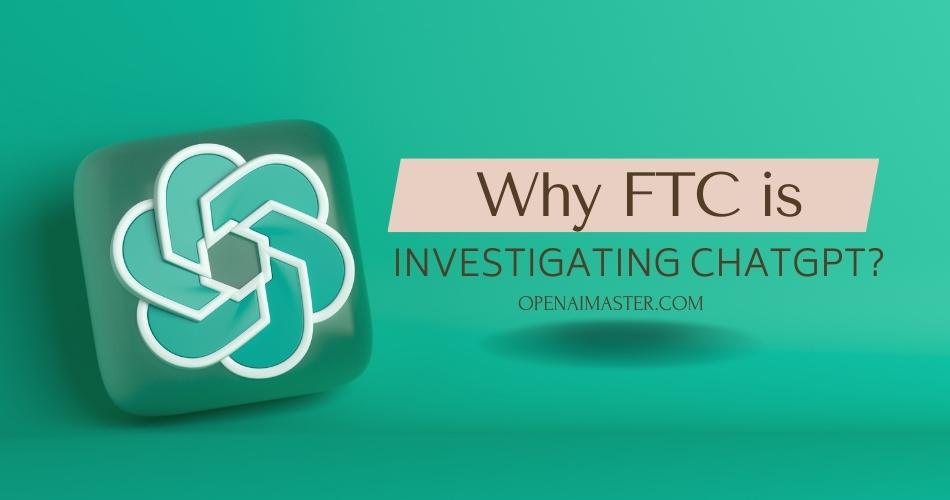OpenAI's ChatGPT Under FTC Scrutiny: A Deep Dive

Table of Contents
The FTC's Concerns Regarding ChatGPT's Data Handling
The FTC's investigation into OpenAI's ChatGPT centers heavily on concerns about the platform's data handling practices. These concerns fall broadly under two key areas: data privacy violations and algorithmic bias and discrimination.
Data Privacy Violations
Potential violations of user data privacy are a primary focus of the FTC's scrutiny. This includes potential breaches of regulations like the California Consumer Privacy Act (CCPA) and the General Data Protection Regulation (GDPR).
- Potential Data Breaches or Misuse: The sheer volume of data processed by ChatGPT raises concerns about potential security vulnerabilities and the risk of unauthorized access or misuse of sensitive user information. This includes the potential for data breaches leading to identity theft or other harms.
- Data Collection, Storage, and Use: Questions remain about how ChatGPT collects, stores, and uses user data. The lack of complete transparency regarding these practices fuels concerns about potential violations of data privacy laws. The breadth of data collected – including personal identifiers, conversation history, and potentially sensitive personal information – is a major point of contention.
- Existing Lawsuits or Complaints: While the FTC investigation is ongoing, it's crucial to note that previous lawsuits and complaints related to data privacy issues involving similar AI technologies highlight the potential for legal ramifications. These precedents add weight to the FTC's concerns.
Algorithmic Bias and Discrimination
Another significant concern revolves around potential biases embedded within ChatGPT's algorithms. These biases can lead to discriminatory outcomes, disproportionately affecting marginalized communities.
- Manifestation of Bias in Responses: ChatGPT's responses are shaped by the vast dataset it was trained on. If this dataset reflects existing societal biases, the chatbot's outputs can perpetuate and amplify those biases. For instance, it may exhibit gender or racial biases in its responses.
- Examples of Biased Outputs: Numerous instances of ChatGPT generating biased or discriminatory outputs have been documented, highlighting the urgent need for algorithmic fairness and mitigation strategies. These examples demonstrate the real-world implications of biased AI.
- Implications for Marginalized Communities: The discriminatory outputs from biased AI systems can have profound and harmful effects on marginalized communities, perpetuating existing inequalities and hindering social progress.
OpenAI's Response to the FTC Investigation
OpenAI has responded to the FTC's investigation with a combination of official statements and concrete actions aimed at addressing the concerns raised.
OpenAI's Official Statements
OpenAI's public statements have generally acknowledged the concerns surrounding data privacy and algorithmic bias. They have emphasized their commitment to responsible AI development and their efforts to mitigate these risks. However, a detailed analysis of their public communications reveals a cautious approach, avoiding outright admissions of wrongdoing.
- Quotes from Press Releases or Official Communications: [Insert relevant quotes from OpenAI's press releases or official statements here. Link to the sources.]
- Analysis of Tone and Messaging: OpenAI's messaging attempts to balance acknowledging the concerns while simultaneously highlighting their efforts to improve the system. The overall tone is generally defensive but also shows a willingness to cooperate.
Steps Taken to Address Concerns
OpenAI has undertaken several steps to address the FTC's concerns, including changes in data handling practices and improvements to algorithms to mitigate bias.
- Changes in Data Handling Practices: [Describe specific changes OpenAI has implemented, such as enhanced data encryption, improved access controls, or stricter data retention policies.]
- Improvements Made to Algorithms to Mitigate Bias: [Detail specific actions taken to address algorithmic bias, such as retraining models on more diverse and representative datasets or implementing fairness-aware algorithms.]
- Increased Transparency Initiatives: [Highlight any increased transparency efforts, such as publishing more detailed reports on data handling practices or making their datasets more accessible for research and audit purposes.]
Implications for the Future of AI Regulation
The FTC's investigation into OpenAI's ChatGPT has significant implications for the future of AI regulation, setting precedents for AI governance and impacting consumer trust and adoption.
Setting Precedents for AI Governance
This investigation could become a landmark case, shaping future regulations for AI companies. The outcome will significantly influence how AI systems are developed, deployed, and regulated in the future.
- Shaping Future Regulations: The FTC's findings and any subsequent actions could set important legal precedents, influencing the development of federal and state-level regulations for AI. This includes establishing standards for data privacy, algorithmic fairness, and transparency.
- Need for Stronger Ethical Guidelines: The investigation highlights the urgent need for stronger ethical guidelines and regulatory frameworks for AI development, ensuring responsible innovation and the protection of user rights.
Impact on Consumer Trust and Adoption
The FTC investigation has the potential to significantly impact consumer trust in AI technologies and influence the adoption rate of AI-powered tools.
- Consequences for OpenAI's Reputation and Market Share: Negative publicity surrounding the investigation could damage OpenAI's reputation and potentially impact its market share.
- Broader Implications for the Adoption of AI-Powered Tools: The outcome of the investigation could influence public perception of AI and its potential benefits and risks, potentially impacting the overall adoption of AI-powered tools across various industries.
Expert Opinions and Public Sentiment
Understanding the various perspectives on the FTC investigation is crucial for a complete picture.
Analysis from Legal Experts
Legal experts offer diverse opinions on the potential outcomes of the FTC investigation. Some believe that the FTC will impose significant penalties on OpenAI, while others anticipate a more lenient approach focusing on remediation rather than punishment.
- Quotes from Relevant Legal Experts: [Insert quotes from legal experts, citing their credentials and linking to their statements if possible.]
Public Reaction to the News
Public reaction to the FTC's scrutiny of ChatGPT has been mixed. While some express concerns about data privacy and algorithmic bias, others defend OpenAI's efforts to develop beneficial AI technologies.
- Online Discussions and Social Media Sentiment: [Summarize public sentiment gleaned from online discussions and social media platforms, noting the range of opinions.]
Conclusion
The FTC's scrutiny of OpenAI's ChatGPT marks a pivotal moment for the future of AI. The investigation highlights crucial concerns about data privacy, algorithmic bias, and the need for stronger regulations in the rapidly evolving field of artificial intelligence. OpenAI's response, while proactive, will be judged ultimately by the FTC's findings. The outcome will significantly shape the development and deployment of AI technologies moving forward. Stay updated on the developments of this crucial investigation and the implications for responsible AI development by following our blog for further analysis on OpenAI's ChatGPT and related AI ethical concerns.

Featured Posts
-
 North East Babies Born During Lockdown Development And Wellbeing
Apr 25, 2025
North East Babies Born During Lockdown Development And Wellbeing
Apr 25, 2025 -
 Ridley Scotts Apple Tv Show 5 Reasons The Early Reviews Are So Encouraging
Apr 25, 2025
Ridley Scotts Apple Tv Show 5 Reasons The Early Reviews Are So Encouraging
Apr 25, 2025 -
 Harrogate Spring Flower Show Back On April 24th
Apr 25, 2025
Harrogate Spring Flower Show Back On April 24th
Apr 25, 2025 -
 Achieving Peace On The Dnieper Challenges And Opportunities
Apr 25, 2025
Achieving Peace On The Dnieper Challenges And Opportunities
Apr 25, 2025 -
 Winnipeg Named Hq Milgaards Sister Calls For Swift Commission Launch
Apr 25, 2025
Winnipeg Named Hq Milgaards Sister Calls For Swift Commission Launch
Apr 25, 2025
